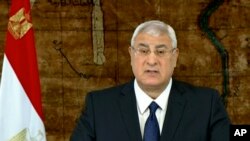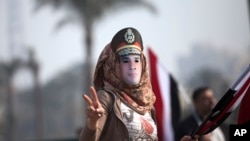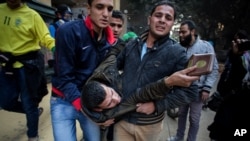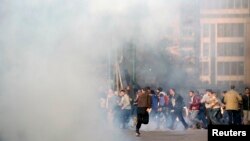CAIRO —
Egypt's interim president has announced a change in the country's political road map, placing presidential elections as the next step in the transition after the ouster of Islamist President Mohamed Morsi last year.
The plan was unveiled one day after clashes between police and protesters left 49 people killed, hundreds wounded and more than 1,000 arrested.
Interim President Adly Mansour's decision to hold the presidential election next was widely expected.
While last year's road map placed parliamentary elections first, the newly approved constitution allows Mansour to decide which comes first.
A popular groundswell and government-organized support for Defense Minister Abdel Fatah el-Sissi, who ousted the country's first freely-elected civilian president after mass protests against his rule, to run as president have been building in recent months.
Other candidates who have expressed interest in running have qualified their bids, saying they would not take part if General Sissi campaigns.
Posters, masks and signs heralding Sissi's leadership were at the center of celebrations of the third anniversary of Egypt's revolution Saturday in Cairo's Tahrir Square.
But just off the square, as well as across Cairo and the country, opponents to the general and the military-backed interim government turned out for rallies and marches.
Clashes between police and Muslim Brotherhood supporters of ousted president Mohamed Morsi, as well as secular activists, were the deadliest this year.
Supporters look to General Sissi as a guarantor of stability, but security lapses in recent days have raised alarms. Four bombs exploded Friday in Cairo, another three in Cairo and Suez on Saturday, and soldiers in the Sinai Peninsula were caught in a deadly ambush Sunday.
The Sinai-based jihadist group Ansar Beit al Maqdis claimed responsibility for the bombings Friday and warned of more attacks to come
Security officials accuse the Muslim Brotherhood of collusion with Ansar Beit al Maqdis and has branded Morsi's organization a terrorist group. Both Islamist groups have openly criticized each other, with the Brotherhood publicly condemning the bombings.
Interim President Mansour warned of further measures to counter the government's definition of terrorism.
He noted Egypt fought terrorism in the 1990s and will do so again. He added the government will not hesitate to take exceptional measures, if needed.
Supporters of the Muslim Brotherhood continued marches Sunday.
The plan was unveiled one day after clashes between police and protesters left 49 people killed, hundreds wounded and more than 1,000 arrested.
Interim President Adly Mansour's decision to hold the presidential election next was widely expected.
While last year's road map placed parliamentary elections first, the newly approved constitution allows Mansour to decide which comes first.
A popular groundswell and government-organized support for Defense Minister Abdel Fatah el-Sissi, who ousted the country's first freely-elected civilian president after mass protests against his rule, to run as president have been building in recent months.
Other candidates who have expressed interest in running have qualified their bids, saying they would not take part if General Sissi campaigns.
Posters, masks and signs heralding Sissi's leadership were at the center of celebrations of the third anniversary of Egypt's revolution Saturday in Cairo's Tahrir Square.
But just off the square, as well as across Cairo and the country, opponents to the general and the military-backed interim government turned out for rallies and marches.
Clashes between police and Muslim Brotherhood supporters of ousted president Mohamed Morsi, as well as secular activists, were the deadliest this year.
Supporters look to General Sissi as a guarantor of stability, but security lapses in recent days have raised alarms. Four bombs exploded Friday in Cairo, another three in Cairo and Suez on Saturday, and soldiers in the Sinai Peninsula were caught in a deadly ambush Sunday.
The Sinai-based jihadist group Ansar Beit al Maqdis claimed responsibility for the bombings Friday and warned of more attacks to come
Security officials accuse the Muslim Brotherhood of collusion with Ansar Beit al Maqdis and has branded Morsi's organization a terrorist group. Both Islamist groups have openly criticized each other, with the Brotherhood publicly condemning the bombings.
Interim President Mansour warned of further measures to counter the government's definition of terrorism.
He noted Egypt fought terrorism in the 1990s and will do so again. He added the government will not hesitate to take exceptional measures, if needed.
Supporters of the Muslim Brotherhood continued marches Sunday.







